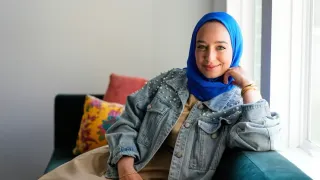November 28, 2018
Anastasia
Will Demers READ TIME: 2 MIN.
Sometimes history can sound much like a fairy tale. Or things that actually happened are remembered in such a way that they seem like legends. A young girl loses her home after her family is murdered. She is an heir to royalty, and her only living relative has relocated from Russia to Paris, France. Anya (Lila Coogan) is now a street sweeper and has lost her memory. He grandmother, the Dowager Empress (Joy Franz) is offering a reward to the person who finds her granddaughter.
"Anastasia" is the lost girl, but is she Anya? This is the question running through a rather famous story, brought to Broadway by the creators of "Ragtime" and this lush, vibrant musical treatment is pure fairy tale. Almost Cinderella-like in its motives, there's no magical godmother, but the peripheral characters are all here. There's the love interest Dimitry (Stephen Brower) who, along with Vlad (Edward Staudenmayer) rule the black market on the streets of Saint Petersburg. Vlad used to know the Dowager Empress' lady in waiting Countess Lily (Tari Kelly) so they hatch a plan to find a girl to fill Anastasia's shoes. And of course, collect the sizeable reward.
The villain is rather a weak one, Gleb (Jason Michael Evans) a Bolshevik general who controls Russia after the first World War, who gets wind of the plan to find Anastasia. As Vlad and Dimitry find Anya to be the most likely candidate, Gleb orders her arrest, citing that she must never try to impersonate royalty but lets her go; he secretly has feelings for her. Evans portrays the thinly drawn antagonist solidly. Staudenmeyer is rather humorous as the scheming Vlad, and he is matched only by Kelly as his old flame. When they reunite in Paris it's quite funny – their number, "The Countess and the Common Man," one of the second act's better numbers.
The first act is, understandably, rather dark, because it sets up Anya's loss of family and her memory. It drags a bit in certain spots, but Act Two makes up for it by being lighter, and more energetic. As the Dowager Empress, Franz makes a grand impression and is delightful; Brower's Dimitry is charming as the love interest for Anya; and Coogan is lovely and has an amazing vocal range as heard in "In My Dreams" "Journey To The Past." Both have a noticeable chemistry, which isn't always there in these types of musicals. The magic, however is the set design by Alexander Dodge, with Tony-winning projection design by Aaron Rhyne. Colorful and sharp digital images highlight a journey from Russia to France and the sets pop with imaginative lighting (Donald Holder).
"Anastasia" is a family-friendly tale that doesn't disappoint; the strong casting and vibrant costumes make this one not to be missed. Musically rich, and with such sweeping vistas you'll find something to cheer for, as Anya finds out that her home is truly where her heart is.
"Anastasia" is running through December 2nd at Providence Performing Arts Center (PPAC) 220 Weybosset Street, Providence, RI 02903. For information or tickets, call 401-421-2997 or visit www.ppacri.org






